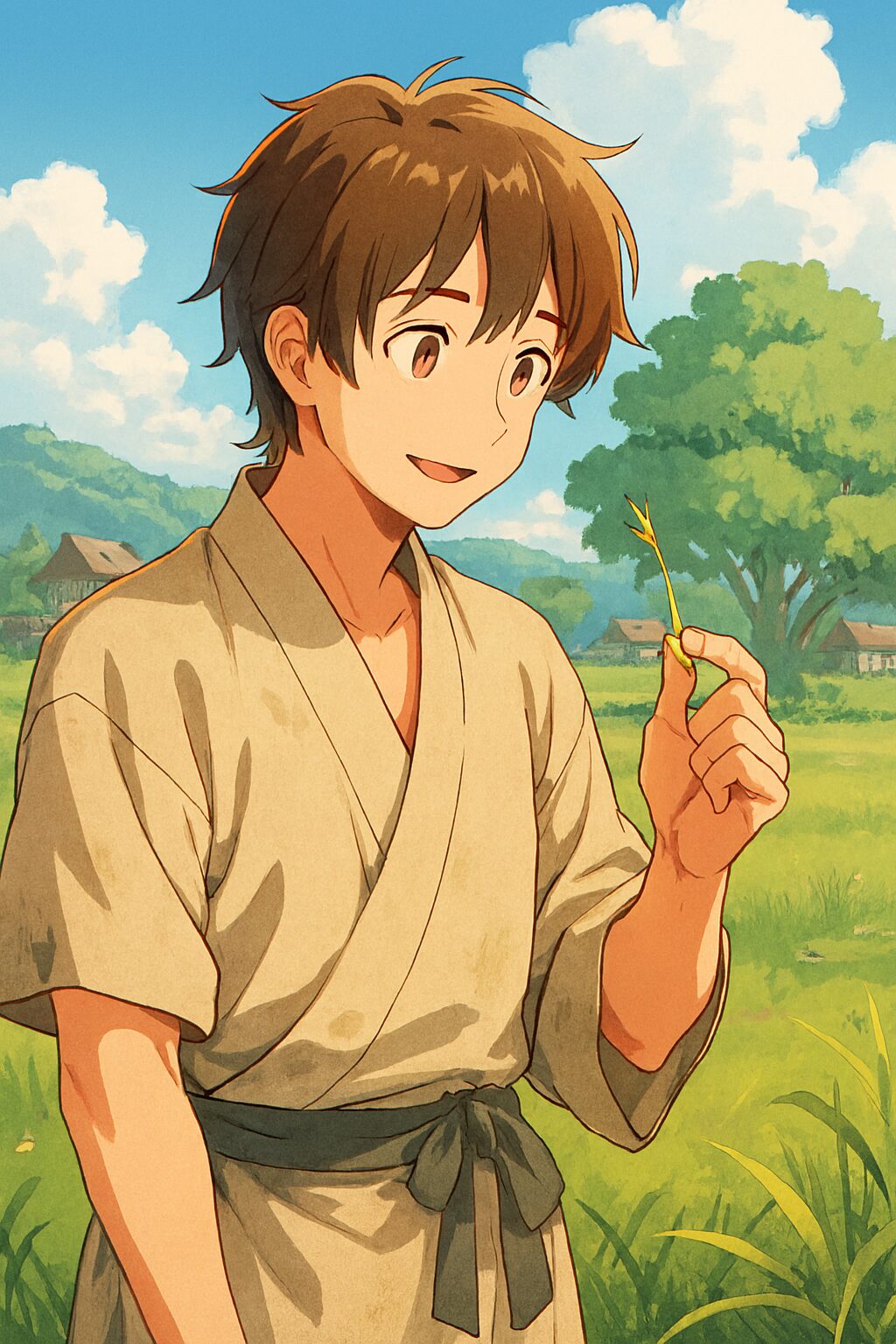- Introduction: Wisdom and Luck in Japanese Folktales
- 📖Story Summary: A Miracle from a Piece of Straw
- 🧠Lessons: Three Insights from the Tale
- 🏯Cultural Background: The Concepts of “En” and Karma
- 🎨Modern Applications: Thinking Like Warashibe Chōja
- 📚Related Links and Resources
- ✍️Conclusion: The Power of a Single Straw
- はじめに|日本の昔話が語る「運」と「知恵」
- 📖物語のあらすじ|一本の藁から始まる奇跡
- 🧠教訓|この物語が伝える3つの知恵
- 🏯文化的背景|「縁」と「因果応報」の思想
- 🎨現代への応用|わらしべ長者的思考とは?
- 📚関連リンク・参考資料
- ✍️まとめ|一本の藁から始まる物語の力
Introduction: Wisdom and Luck in Japanese Folktales
Japanese folktales are more than stories for children—they carry timeless values and life lessons passed down through generations.
“Warashibe Chōja” is a symbolic tale about a poor man who starts with nothing but a single piece of straw and eventually becomes wealthy. It reflects the Japanese spirit of connection, kindness, and resourcefulness.
📖Story Summary: A Miracle from a Piece of Straw
Long ago, a poor man prayed to Kannon, the goddess of mercy, asking to become happy. She told him, “Cherish the first thing you touch.”
As he left the temple, he picked up a piece of straw.
“Can something like this really bring me happiness…?”
Though doubtful, he held onto the straw and began walking. What followed was a series of unexpected encounters:
- He gave a child the straw with a fly on it and received an orange in return
- He gave the orange to a thirsty woman and received a piece of silk
- He gave the silk to a merchant and received a horse
- He helped a nobleman with the horse and was rewarded with marriage to the noble’s daughter and a grand estate
Thus, the man became a wealthy “chōja” (landowner) starting from a single piece of straw.
🧠Lessons: Three Insights from the Tale
1. Even the Smallest Things Hold Value
What seems worthless—like straw—can become valuable depending on how it’s used.
2. Giving Leads to Receiving
The man always helped others by solving their problems. This spirit of generosity led to unexpected rewards.
3. Action Attracts Opportunity
By trusting Kannon’s words and taking action, the man changed his fate. Luck often follows movement, not waiting.
🏯Cultural Background: The Concepts of “En” and Karma
This story reflects key Japanese values:
- Respect for chance encounters
- Belief that relationships shape destiny
- Good deeds bring good outcomes (karma)
These ideas remain deeply rooted in Japanese society and influence modern relationships and business practices.
🎨Modern Applications: Thinking Like Warashibe Chōja
This folktale offers insights that apply even today:
- A small blog post or social media idea could be your “straw”
- Tiny ideas can grow into major projects
- Helping others can lead to unexpected opportunities
Believing in your first step and acting on it—that’s the mindset of Warashibe Chōja in the modern world.
📚Related Links and Resources
✍️Conclusion: The Power of a Single Straw
“Warashibe Chōja” is more than a folktale—it’s a story about life’s possibilities.
A small step can lead to a big future.
May this story inspire new insights and hope for readers around the world.
🍀わらしべ長者|一本の藁から始まる幸運の物語
はじめに|日本の昔話が語る「運」と「知恵」
日本の昔話は、単なる子ども向けの物語ではありません。そこには、時代を超えて受け継がれてきた価値観や人生の教訓が込められています。
今回ご紹介する「わらしべ長者」は、何も持たない男が一本の藁から始めて、幸運を手にする物語。日本人の「縁」や「利他」の精神が色濃く反映された、非常に象徴的な昔話です。
📖物語のあらすじ|一本の藁から始まる奇跡
昔々、ある貧しい男が「幸せになりたい」と願って観音様にお参りしました。すると観音様は、「最初に手にしたものを大切にしなさい」と告げます。
男が寺を出ると、偶然一本の藁を拾いました。
「こんなものが幸せを呼ぶのか…?」
半信半疑ながらも、その藁を手に歩き始めると、次々と不思議な出会いが起こります。
- 藁に止まったアブを子どもにあげると、代わりに蜜柑をもらう
- 蜜柑を喉の渇いた女性に渡すと、絹の布をもらう
- 絹を商人に渡すと、馬をもらう
- 馬を助けた豪族に気に入られ、ついには娘と結婚し、大きな屋敷を得る
こうして男は、一本の藁から始まり、ついには「長者(大金持ち)」となったのです。
🧠教訓|この物語が伝える3つの知恵
1. 小さなものでも価値がある
藁のような「無価値」に見えるものでも、使い方次第で大きな価値を生むことができる。
2. 与えることで得られる
男は物々交換の中で、常に「相手の困りごとを解決する」姿勢を持っていました。これは「利他の心」が幸運を呼ぶという考え方です。
3. 行動することが運を呼ぶ
観音様の言葉を信じて動いたからこそ、運命が動き始めました。待つだけではなく、動くことでチャンスが生まれるのです。
🏯文化的背景|「縁」と「因果応報」の思想
この物語には、日本人が大切にしてきた「縁(えん)」の考え方が色濃く反映されています。
- 偶然の出会いを大切にする
- 人との関係性が運命を変える
- 善い行いが善い結果を生む(因果応報)
こうした価値観は、現代の日本社会にも根強く残っており、ビジネスや人間関係にも影響を与えています。
🎨現代への応用|わらしべ長者的思考とは?
この物語は、現代にも応用できる考え方を教えてくれます。
- SNSやブログでの発信も「藁」から始まるかもしれない
- 小さなアイデアが大きなプロジェクトに育つこともある
- 誰かの役に立つことで、思わぬチャンスが舞い込む
「最初の一歩を信じて動くこと」こそが、現代のわらしべ長者的思考と言えるでしょう。
📚関連リンク・参考資料
✍️まとめ|一本の藁から始まる物語の力
「わらしべ長者」は、ただの昔話ではなく、人生の可能性を教えてくれる物語です。
小さな一歩が、大きな未来につながる。
この物語が、読者の皆さんにとって新たな気づきや希望のきっかけとなれば幸いです。



コメント